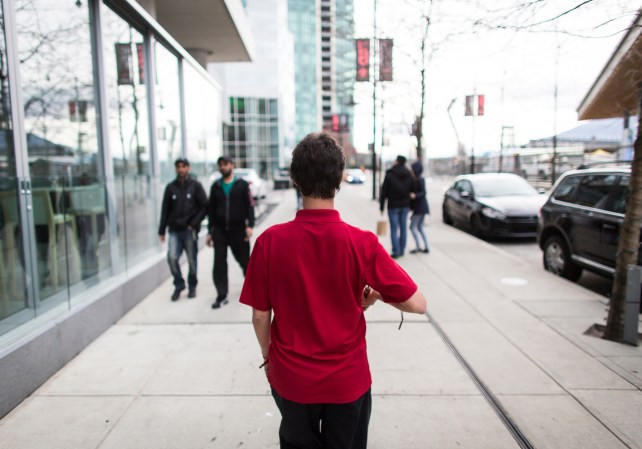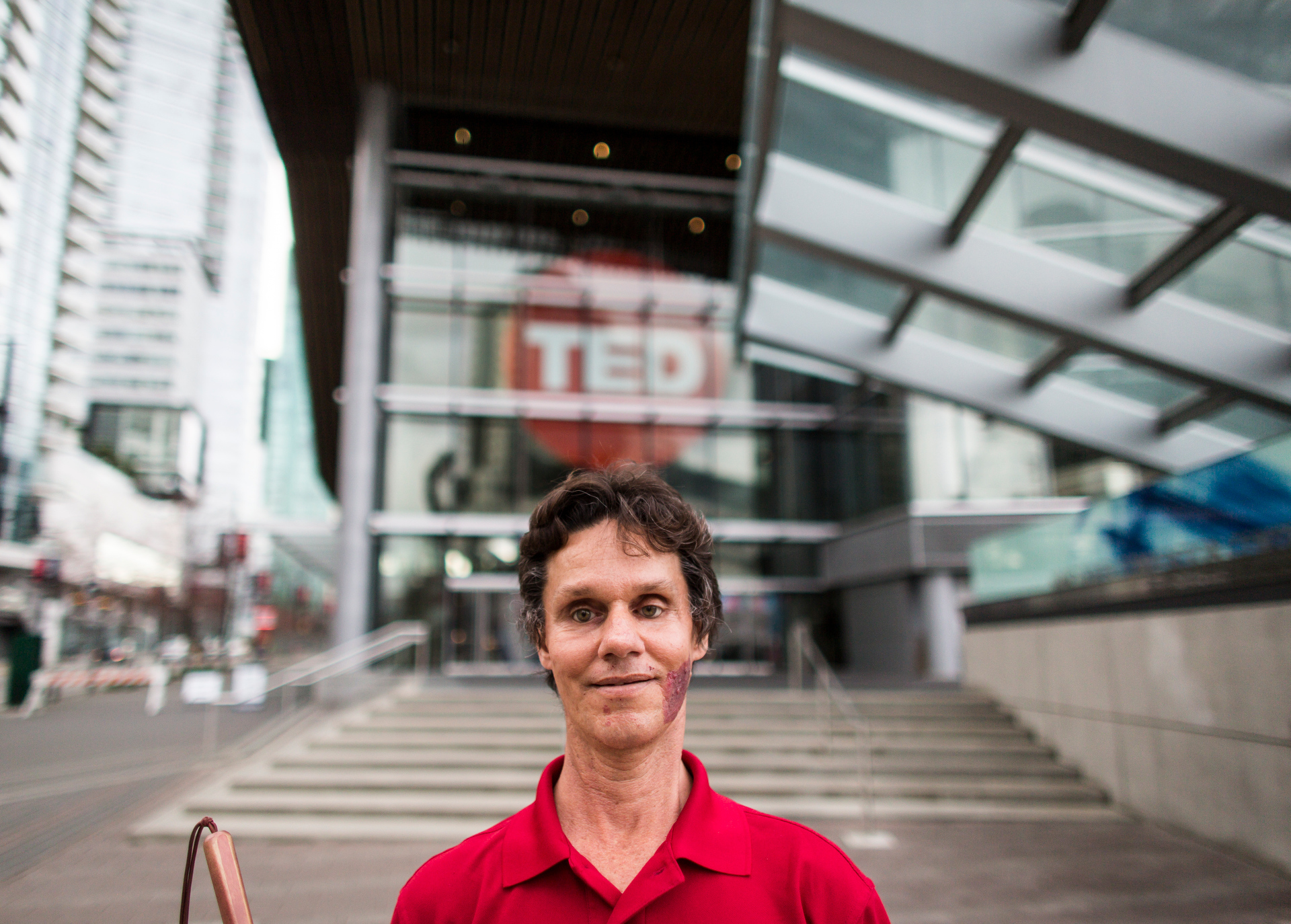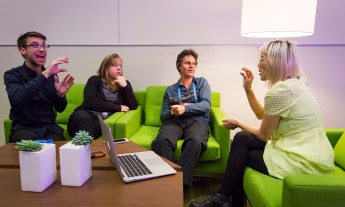
Daniel Kish glides a white cane over the marble floor of the Fairmont Pacific Rim Hotel. He’s in Vancouver, Canada, to speak at TED2015, and he’s just been alerted by the speaker concierge that he is needed backstage for his rehearsal.
“Mr. Kish, there’s a little bit of a step there,” says a bellhop, motioning to a hump in the pavement as he swings open the hotel’s doors. But the warning is not necessary; Kish has already recognized the uneven terrain and negotiated it. As we bank a right, he slows and makes a clicking noise with his mouth. Then he takes off again.
Kish, who has been blind since he was 13 months old, navigates the world using echolocation. He creates a vacuum between his tongue and the top of his mouth, sending out flashes of sound that bounce off objects in the environment and back to him. In this way, he constructs an understanding of the space around him that allows him to negotiate the world with freedom and confidence.
His TED Talk will focus on the mechanics of echolocation, yes, but he hopes that listeners will absorb a more universal message too. “People are interested in the echolocation, in how and why it works, but most people will never use it,” he says. “So I hope that people come away with a takeaway that pertains to the challenges they face. We get so overwhelmed by challenges — and I do too, but I was raised without fear. There were lots of things to be afraid of, but the emphasis was on facing fear.”

Making his signature clicks, Kish bounds up the concrete stairs to the Vancouver Convention Centre. He makes his way past the registration desk and through a bank of heavy curtains. We enter an industrial hall, a secret passageway to the TED stage. Before, this hallway had seemed quiet to me. But with Kish, I am aware of all the noises — the aggressive whir of a bank of refrigerators, the muffled boom of a speaker mid-rehearsal, hammering in the distance as crews prepare for the conference’s start.
A left, and we are backstage. While I am disoriented by the sudden darkness, Kish barrels past banks of computers and control boards with blinking lights and around a giant stack of trunks. He has a conversation with the stage manager and gets fitted with a collar mic. And like that, he is in the wings, using both his cane and a few clicks through a corridor, a billowy curtain to his left, wooden scaffolding to the right.
Then he moves toward the stage, clicking as he figures out the stairs, then spending time exploring the 16-foot platform. Once he’s got his bearings, he begins to rehearse his talk.
“Blindness is thought to epitomize ignorance. It means hapless exposure to the ravages of the dark unknown,” he begins, his voice warm but authoritative, booming but soft. “It is people’s perceptions of blindness that are far more threatening to blind people than blindness itself.”
I think back to the last hour with Kish, and the way that sighted people react to him. As he walked down the street, people cleared the way, a subconscious reaction to his cane. Once we reached the conference center, there was a chorus of “this way”’s from people trying to be helpful. My own response: a desire to narrate the walk, to let him know about the faux living room to our right or the wrinkled plastic film covering the carpet under our feet.

Later, I ask Kish what he would like sighted people to offer him. “Very little,” he says. “I don’t mind if people tell me things — I can choose to listen or not. The issue more is when people become jumpy and nervous. That becomes bothersome.”
Sometimes known as the real-life Batman, Kish says that while he was initially uncomfortable with the nickname, he’s now embraced it. “I’ve always liked Batman. As a superhero, he is the most human,” he says. “His super-abilities do not come from magic, or the fourth dimension, or another planet. He’s not some divine being descended from a demi-god — he’s a human who has refined himself to be the best that he can. That’s really what we stand for at my nonprofit, World Access for the Blind — testing your limits. And standing up against the injustices of restrictions and restraints against blind people.”
He tilts his head. “And bats are cool.”
With Kish’s rehearsal completed, we leave the theater. As we walk around the conference center, I ask more questions. Kish has said that different buildings and different vehicles have different sounds. I wonder: do people?
“Echo-wise, people basically look like indistinct blobs. You get a general shape or height,” he says. “But people give you a sense of presence. So even if we’re moving in a crowded place, it’s not really a problem to follow them.”
“Why do you think sighted people put so much value on being able to see?” I ask. “Do we overvalue sight?”
Kish looks thoughtful for a moment. “Vision is awesome. You can look up and see for thousands of light-years. The range of my echolocation is hundreds of meters,” he says. “The ability to see the breadth and depth and scale that vision affords, I don’t think that can be overvalued.”
He pauses, and turns. “I think the mistake being made is the exclusivity of vision. Vision has become the all of people’s perception. It’s so difficult for a sighted person to understand non-sightism — and it has created an enormous divide between sighted and non-sighted people,” he says. “I want to see a relaxation of sight-centrism. That doesn’t mean appreciate sight less, but to give understanding to that which is not sight.”
Kish continues. “We work with students who were never given a cane, were never taught how to travel anywhere on their own, because it was assumed that they didn’t need to — they’ll always have someone with them, right? My response to that is just to give them a cane, teach them to click, get them out there and see what happens. It’s not up to society to predefine limits for someone else. I tend to assume that the sky’s the limit.”
Photos by Ryan Lash/TED.











